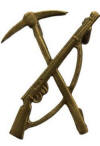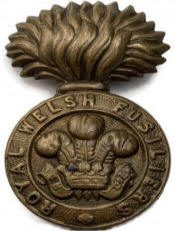|
The 4th (Denbighshire) Battalion TF
(detailed history
here) was
formed on 1st April 1908 as a result of the Territorial and Reserve
Forces Act 1907, and was based at Poyser Street, Wrexham, under
command of the North Wales Brigade, Welsh Division TF.
On mobilisation, the Battalion was moved to its war
location at Conway and at the end of August 1914 to the Northampton
area to prepare it for service in India but on 18th November it was
warned for combat operations with the BEF (it
was one of the first TF units to reinforce the hard-pressed Regular British
Expeditionary Force
on the Western Front). In September
1914, the Battalion was split into two separate units.
The 1/4th Battalion was formed from men who has signed the Imperial
Service Order and were fit for combat, and the 2/4th Battalion from
men who could not or would not sign up for Imperial Service.
On 5th November 1914 the 1/4th Battalion was moved by train to
Southampton and embarked for Le Havre on HMT "Architect", arriving
there on 6th November. The Battalion then concentrated
at a camp near Le Havre and departed for St Omer, via Abbeville, by
train on 9th November. Billeted at a camp at Heuringhem,
south of St Omer, the Battalion went on route marches, practiced
musketry, battle and field skills and undertook physical exercise
until 13th November when it commenced the art of digging and
draining trenches. Intensive training continued until 6th
December 1914 when the Battalion marched to Hazebrouck and then on
7th December to Bailleul when it came under command of 3rd Brigade,
1st Division. The Battalion saw action at Givenchy and
Aubers Ridge and remained under command of 1st Division until 1st
December 1915 when it was transferred to 47th (2nd London) Division
as the Pioneer Battalion. Full details of the battles and
operations that the 47th Division took part in can be
viewed here.
At the Armistice on 11th November 1918 the Battalion at was
stationed at Bizencourt, near Tournai. On 13th November
the Battalion marched to east to Beclers and was put to work on
railway repairs before marching west to Angstaing on 18th November.
The Division continued its march westward to the Auchel area, west
of Bethune, arriving there on 27th November, when the Battalion was
quartered at Rimbert, undertaking educational lectures but
continuing military and physical training. The Battalion
remained here until 3rd January 1919 when it marched east to new
billets at Labeauvriere. Gradual demobilisation began on
5th January 1919 and continued throughout February and March.
The Battalion marched west to Calonne Ricouart on 18th March 1919
and 2 officers and 6 men were moved to Dunkirk to join the 26th
Battalion. On 28th March 1919 the 47th (2nd London)
Division ceased to exist and became the 47th Brigade Group of
Cadres. Throughout April and May demobilisation continued and
selected officers and men left to join the 26th Battalion.
On 10th May 1919 the Battalion Cadre was bussed to Pernes and then
to le Havre arriving on the 11th May. The Cadre embarked
for the UK 15th May 1919.

The
brass “collar dog” insignia worn by men of Pioneer Battalions in the
British Expeditionary Force. The design is of a crossed rifle and pick,
representing the battalion's dual fighting and labouring role.
The 2/4th Battalion TF
was formed at Wrexham on 11th September 1914 the from men who could
not or would not sign up for Imperial Service. The
Battalion remained at Wrexham until March 1915 when it was moved to
Northampton. On 22nd April 1915 the Battalion was placed
under command of 203rd (2nd North Wales) Brigade, 68th (2nd Welsh)
Division . The Battalion was moved to Bedford area
in July 1915, to Aldeburgh, Suffolk in November 1916 and to Henham
Park Halesworth, Suffolk in May 1917. The
Battalion was finally moved to Yarmouth in October 1917 and was
disbanded there in March 1918.
The 3/4th Battalion
was formed at Wrexham in March 1915 as a Depot unit for the 1/4th
and 2/4th Battalions providing trained reinforcements.
On 8th April 1916, at Oswestry, it was renamed the 4th (Reserve)
Battalion TF and on 1st September 1916, in the Welsh Reserve
Brigade, absorbed the 5th, 6th and 7th (Reserve) Battalions TF.
In March 1818, the Battalion was moved to Kinmel Park, Rhyl, and in
July 1918 to Herne Bay in Kent until disbandment on 23rd September
1919.
|

